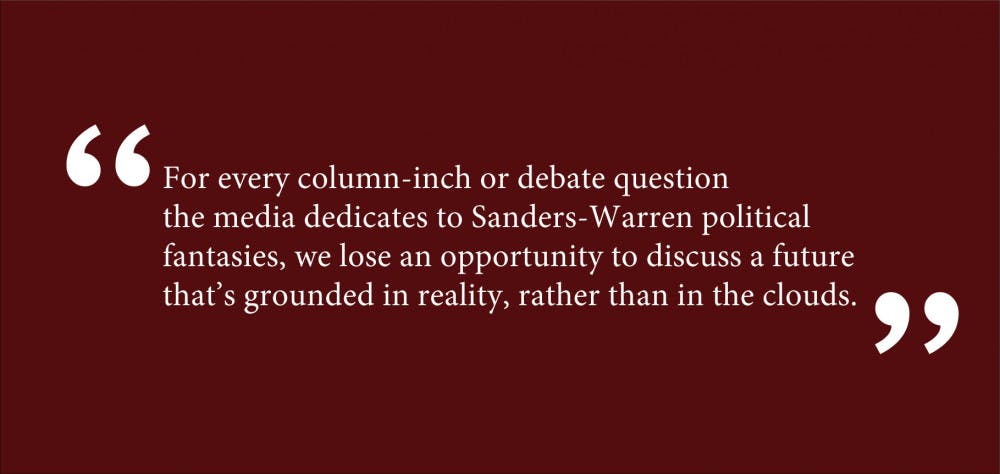In a recent interview with the New York Times Editorial Board, Senator Bernie Sanders was asked how he would, as president, push his legislative agenda through a Mitch McConnell-controlled Senate. “(N)ot only will I be commander in chief, I will be organizer in chief,” Sanders answered. “I think the agenda that we have brought out in almost every case is supported by the American people.” When pressed, Sanders said his legislative strategy involves wielding grassroots support for his proposals to force Congress to enact his legislative goals, chief among them his Medicare-for-All healthcare plan.
But while Medicare-for-All and other progressive initiatives have taken center stage in the Democratic primary, there has been little discussion regarding the political viability of these policies. Thus far, Democrats have spent so much time debating pie-in-the-sky solutions that anything resembling feasible policy is relegated to a new subclass of Democratic politics: realism. Instead of discussing practical solutions to the problems facing this country, Democratic primary candidates have focused their attention on a series of far-left policies; even the least extreme of these proposals has next to no chance of passing through the Senate.
It’s no surprise that practicality has taken a backseat, given that even broaching the subject can be a one-way ticket out of the race. During a July debate, Congressman John Delaney attacked Senator Warren’s plans as unrealistic, “impossible promises.” Warren replied, “I don’t understand why anybody goes (through) all the trouble of running for president of the United States just to talk about what we really can’t do and shouldn’t fight for.” Pundits hailed the quip as “the line of the night.” Congressman Delaney exited the race last week, after months of polling at zero percent.
Since when did it become taboo to discuss political reality? Certainly, politicians’ overpromising is nothing new. However, the heightened degree of dishonesty and the vitriol with which one is attacked for pointing it out is alarming. This country faces serious challenges in the near future: tackling a growing national debt while protecting essential government programs, combatting the threat of climate change and fixing a healthcare system where getting sick may mean going bankrupt. And the seriousness of those challenges necessitates solutions that are themselves serious — in large part because they are practical. Bernie Sanders may be leading, as he says, a political revolution in this country. He clearly has energetic supporters — and a lot of them. But he has also been in the Senate long enough to understand that Mitch McConnell will not be persuaded by a cavalcade of Bernie Bros. To pretend otherwise detracts from much-needed discussion and debate over politically feasible solutions to real problems facing real people.
To some extent, it is true that Republicans and Mitch McConnell are the biggest obstacles to Warren and Sanders’ legislative goals. But at a more fundamental level, their real enemy is math. Democrats need to gain 13 seats to have a filibuster-proof majority in the Senate (accounting for the two independents, Sanders being one, who caucus with the Democrats). According to the Cook Political Report, there are exactly 14 Senate seats in the upcoming election not rated “Solid Democrat” or “Solid Republican.” Four are held by Democrats, 10 by Republicans. If the Democrats held every seat they currently occupy and win every single “Toss-up,” “Lean-Republican” and “Likely-Republican,” they still fall three votes short of a 60-vote majority. And if Sanders is hoping to pick off a few of those “Solid Republican” seats, consider this: Since the Seventeenth Amendment established the direct election of senators, no party has flipped more than 12 Senate seats in an election, ever.
So, it appears that if Sanders or Warren expect to get anything done in the Senate, they’ll need at least some Republican support. Well, what about Bernie’s plan to use grassroots support to persuade the ever-conciliatory Mitch McConnell? Let’s take Sanders’ flagship Medicare-for-All proposal as an example. He loves to tout polls showing majority support for Medicare-for-All. And indeed, when asked whether they support Medicare-for-All, a majority of Americans consistently say they do. Unfortunately for Sanders’ grassroots strategy, these polls are more dispositive of a misunderstanding of his proposal rather than actual support. Sanders’ plan is to move to an entirely government-run health insurance system, which means abolishing all forms of private health insurance. And when polled, only 22 percent of registered Democrats say they favor a Medicare-for-All plan that abolishes private health insurance; among all voters, that number drops to just 13 percent. And before Sanders and Warren try to convince 87 percent of the country to join their grassroots movement, they may want to talk to the 24 of 27 declared Democratic primary candidates who either do not support their Medicare-for-All proposal or are also open to other options like Medicare-for-Some.
Ordinarily, I would say Sanders and Warren’s policy proposals are harmless political wish-making. However, the time Americans are willing to spend focusing on political discourse is limited. And, up to this point, that scarce resource has been squandered talking about the virtues of issues like decriminalizing illegal border crossings, gun confiscation, abolishing private health insurance and a whole host of other unpopular — not to mention could-never-happen — policy proposals. If we are going to solve these problems, Democrats need to be willing to discuss feasible solutions. Perhaps there is a large segment of the population who want their politicians to be the uncompromising, swing-for-the-fences type. Certainly, Warren and Sanders’ performance thus far is evidence of that. But for every column-inch or debate question the media dedicates to Sanders-Warren political fantasies, we lose an opportunity to discuss a future that’s grounded in reality, rather than in the clouds.
Andrew Reed ’21 can be reached at andrew_reed@brown.edu. Please send responses to this opinion to letters@browndailyherald.com and op-eds to opinions@browndailyherald.com.





